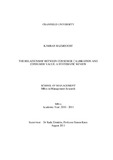JavaScript is disabled for your browser. Some features of this site may not work without it.
| dc.contributor.advisor | Dimitriu, Radu | |
| dc.contributor.advisor | Knox, Simon | |
| dc.contributor.author | Razmdoost, Kamran | |
| dc.date.accessioned | 2012-02-22T11:19:05Z | |
| dc.date.available | 2012-02-22T11:19:05Z | |
| dc.date.issued | 2011-08 | |
| dc.identifier.uri | http://dspace.lib.cranfield.ac.uk/handle/1826/7020 | |
| dc.description.abstract | Consumers’ perceptions of their resources in consumption tasks (that is, their abilities and endowments to perform consumption tasks) are many times not accurate. This misjudgement of resources negatively influences their performance in consuming or using products and services. Further, this carries on to influence consumers’ perceived value of products or services. In order to represent this phenomenon, consumer calibration is defined as the agreement between the subjective and objective assessment of consumer resources required in a consumption task. Therefore, it is crucial to discover the role of consumer calibration in the consumption experience. This paper proposes that consumer calibration occurs at two levels: of the task and of the self. Consumer task calibration refers to the extent of error in the task-required resource appraisal, whereas consumer self-calibration is the degree of accuracy in one’s self-perception of abilities. This systematic literature review is conducted to explore the relationships between consumer self and task calibration, on the one hand, and consumer value, on the other hand. After screening 2297 studies, based on their relevance and quality, forty texts in three main academic domains of Marketing, Psychology and Information Systems are selected for analysis and synthesis. The results reveal that subjective and objective assessments of consumer resources and task-required resources influence consumer value through their impact on functional performance and emotional consequences. The findings also suggest that, although a relationship between consumer task and self-calibration exists, their relationship with consumer value and their emotional consequences need further scrutiny. Consequently, a model for the effect of consumer calibration on consumer value is developed, based on the relationships established in the literature reviewed and the interpretation of the findings in the studies reviewed. | en_UK |
| dc.language.iso | en | en_UK |
| dc.publisher | Cranfield University | en_UK |
| dc.rights | © Cranfield University 2011. All rights reserved. No part of this publication may be reproduced without the written permission of the copyright owner. | en_UK |
| dc.subject | Self-calibration | en_UK |
| dc.subject | Task Calibration | en_UK |
| dc.subject | Consumer Resources | en_UK |
| dc.subject | Self-efficacy | en_UK |
| dc.subject | Subjective Consumer Resources | en_UK |
| dc.subject | Task Perception | en_UK |
| dc.title | The relationship between consumer calibration and consumer value : a systematic review | en_UK |
| dc.type | Thesis or dissertation | en_UK |
| dc.type.qualificationlevel | Masters | en_UK |
| dc.type.qualificationname | MSc by Research | en_UK |
